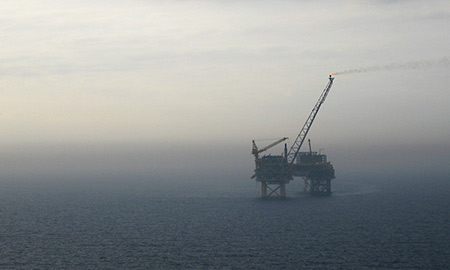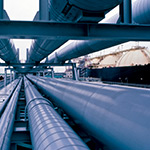Kemp: Britain's North Sea Oil, Gas Firms Must Look To Future Abroad


John Kemp is a Reuters market analyst. The views expressed are his own
LONDON, March 12 (Reuters) - Britain's North Sea oil and gas operators are mounting an impressive lobbying campaign to win tax concessions and other government help ahead of the final budget of this parliament on March 18.
In an editorial in Thursday's Financial Times newspaper endorsed the idea of "a new deal to keep North Sea oil flowing". The newspaper wants the complex system of tax allowances to be simplified, rates cut, and more risk-sharing between exploration companies and taxpayers.
It also wants the government to find ways to defer the decommissioning of old platforms, pipeline systems and other infrastructure - originally built to exploit giant fields like Forties and Brent discovered in the 1970s and 1980s - which are now key to the profitable exploitation of smaller finds made in recent years.
The newspaper insists "this would not be a return to a 1970s-style industrial policy, when government subsidised dying industries such as shipbuilding that were more rationally conducted overseas. It is a perfectly sensible way of maximising the value of the UK's endowment of oil reserves and also preserving the country's energy security. It would also be a way to keep existing infrastructure up and running as old wells expire."
A more cynical observer might conclude that it is exactly a return to industrial policy. And the more apt comparison is not with shipbuilding but the coal industry, which was allowed to wither in the 1980s and 1990s when it could not compete with the surge of cheap North Sea gas.
Exhaustion v Profitability
The North Sea has already produced 42 billion barrels of oil and gas, but could have as much as 24 billion barrels left, according to FT columnist Nick Butler ("Don't abandon the North Sea" Feb 22).
For North Sea operators and their supporters, the remaining reserves provide a compelling economic reason to keep producing to avoid leaving value locked in the ground.
The reserves represent tens of billions of dollars in profits, wages and tax revenues that would be lost if the North Sea fields are abandoned prematurely.
North Sea reserves have a strong political dimension because most operators and service companies are based in Scotland, where separatist sentiment remains strong despite the rejection of independence in last year's referendum.
The economic reality is more complicated. The notional value of the oil and gas that would remain locked in the ground is not a convincing reason why it should be developed. In a market-based economy, resources are developed only if they can be extracted profitably.
And there are many instances where resources have been left in the ground or abandoned because it was no longer possible to exploit them profitably.
The distinction between exhaustion and profitability was central to the year-long dispute between the National Union Mineworkers (NUM) and the Conservative government led by Margaret Thatcher, the defining moment in Britain's modern economic history.
In the early 1980s, Britain's state-owned coal company wanted to close mines that were no longer profitable while the NUM resolved "to re-affirm the union's opposition to all pit closures other than on grounds of exhaustion."
The NUM demanded that pits remain open as a source of employment and national energy security as long as there was valuable coal underground ("Crisis management in the power industry" 1995).
Ironically, coal's nemesis came from the giant gas fields found in the North Sea between the 1950s and 1970s, which threatened coal's dominance in power generation ("Energy, the State and the Market" 2003).
Once the government's support for coal was removed after the strike was broken, construction of coal-fired power plants ended and power producers raced to build cheaper gas-fired facilities to capitalise on the cheaper fuel.
By the end of the 1990s, nearly all of Britain's pits had closed, although there were still billions of tonnes of coal left underground. Twenty years later, Britain's gas supplies are dwindling, and the country increasingly relies on imported gas from overseas, raising concerns about "energy security".
If energy security had been the clinching argument, the government would have intervened to keep more pits open. Instead, Britain chose a market-based approach. There is no reason why North Sea oil and gas producers should be treated any differently.
Unfavourable Conditions
Britain's oil and gas producers are among the victims of the North American shale revolution and the price war between OPEC and the U.S. shale industry.
Like Canada's oil sands industry, which is also suffering, the North Sea is a relatively expensive source of oil and gas. In recent years, its prospects have depended on oil and gas remaining scarce and prices remaining high.
The North Sea must compete for investment with other oil and gas plays around the world. Before the shale revolution North Sea oil and gas appeared marginally profitable. But with oil prices now around $60 per barrel and widely expected to remain well below $100 for the next few years, the North Sea is no longer an attractive investment proposition.
UK operators tend to blame their problems on the tax regime, which they claim is more punitive and complicated than in other parts of the world. While there is some truth in this argument, the tax regime's complexity is the legacy of government efforts to clamp down on previous tax avoidance.
In any event, the UK North Sea's problems run much deeper than tax. Offshore platforms in a notoriously stormy area are a more expensive way to produce oil and gas than onshore shale plays in the United States.
The giant oil and gas fields discovered in the 1960s, 1970s and 1980s could spread the fixed costs of platforms, pipelines and other infrastructure over a large volume of production. Recent field discoveries have been much smaller and have no such economies of scale.
Recent discoveries can only be profitable if they can utilise the existing infrastructure. The problem is that the infrastructure isn't free and it isn't public property: it belongs to existing operators, most of them major oil and gas companies, who have a legal obligation to decommission it.
If the infrastructure's life is to be extended and decommissioning is to be deferred, money will have to be found for routine maintenance as well as capital upgrades.
There is a standoff between the would-be operators of small-scale new fields (who want the infrastructure to be preserved but don't want to pay high fees) and the bigger legacy operators (who want to get on with decommissioning or charge significant fees to maintain the infrastructure for longer).
The dispute is often caricatured as a disagreement between entrepreneurial operators and stubborn greedy majors. In truth, it is a dispute about the costs of prolonging the life of the infrastructure and who should pay for them.
In a world where oil and gas were thought to be running out and prices were expected to keep on rising, it might have made sense to extend the useful life of the North Sea infrastructure. In a world of $60 oil, the economics are much more challenging.
Over the last 50 years, Britain has developed world-class expertise in offshore oil and gas engineering, which supports thousands of highly skilled jobs, and it would be a shame to lose it. But the industry's future increasingly lies in selling that expertise abroad, rather than developing the North Sea itself.
(Editing by William Hardy)
WHAT DO YOU THINK?
Generated by readers, the comments included herein do not reflect the views and opinions of Rigzone. All comments are subject to editorial review. Off-topic, inappropriate or insulting comments will be removed.
- Weatherford CEO's Rebound Plan Relies On Getting Smaller
- Iran Says Oil Market Is Too Tight For US Zero Exports Target
- China's Squeezed 'Teapots' Eye Petchem Path To Riches
- Baker Hughes: US Drillers Add Oil Rigs For Second Week In Three
- Venezuela Hands China More Oil Presence, But No Mention Of New Funds
- What's Next for Oil? Analysts Weigh In After Iran's Attack
- Venezuela Authorities Arrest Two Senior Energy Officials
- CNOOC Bags Contract for 4.6 MMcf of LNG for Philippines
- EU Gas Storage Nearly 60 Percent Full at End of Heating Season
- EIA Raises WTI Oil Price Forecasts
- ExxonMobil Makes FID on 6th Project in Contested Guyana Asset
- Is The Iran Nuclear Deal Revival Project Dead?
- ORE Catapult Looks for New CEO as Jamieson Steps Down
- Japan's Mizuho Invests $3.64MM in Bison's CCS Project in Alberta
- Equinor Advances First Battery Storage Projects in USA
- Macquarie Strategists Warn of Large Oil Price Correction
- JPMorgan CEO Says LNG Projects Delayed Mainly for Political Reasons
- USA, Venezuela Secretly Meet in Mexico as Oil Sanctions Deadline Nears
- EIA Ups Brent Oil Price Forecast for 2024 and 2025
- Petrobras Discovers Oil in Potiguar Basin
- EIR Says Oil Demand Will Not Peak Before 2030
- Biden Plans Sweeping Effort to Block Arctic Oil Drilling
- Pantheon Upgrades Kodiak Estimates to 1.2 Billion Barrels
- Dryad Flags Red Sea 'Electronic Warfare' Alert
- Russian Oil Is Once Again Trading Far Above the G-7 Price Cap Everywhere
- Oil and Gas Executives Predict WTI Oil Price
- New China Climate Chief Says Fossil Fuels Must Keep a Role
- Chinese Mega Company Makes Another Major Oilfield Discovery
- Oil and Gas Execs Reveal Where They See Henry Hub Price Heading
- Equinor Makes Discovery in North Sea
- ExxonMobil Racks Up Discoveries in Guyana Block Eyed by Chevron
- Macquarie Strategists Warn of Large Oil Price Correction
- DOI Announces Proposal for Second GOM Offshore Wind Auction
- Standard Chartered Reiterates $94 Brent Call
- Chevron, Hess Confident Embattled Merger Will Close Mid-2024







